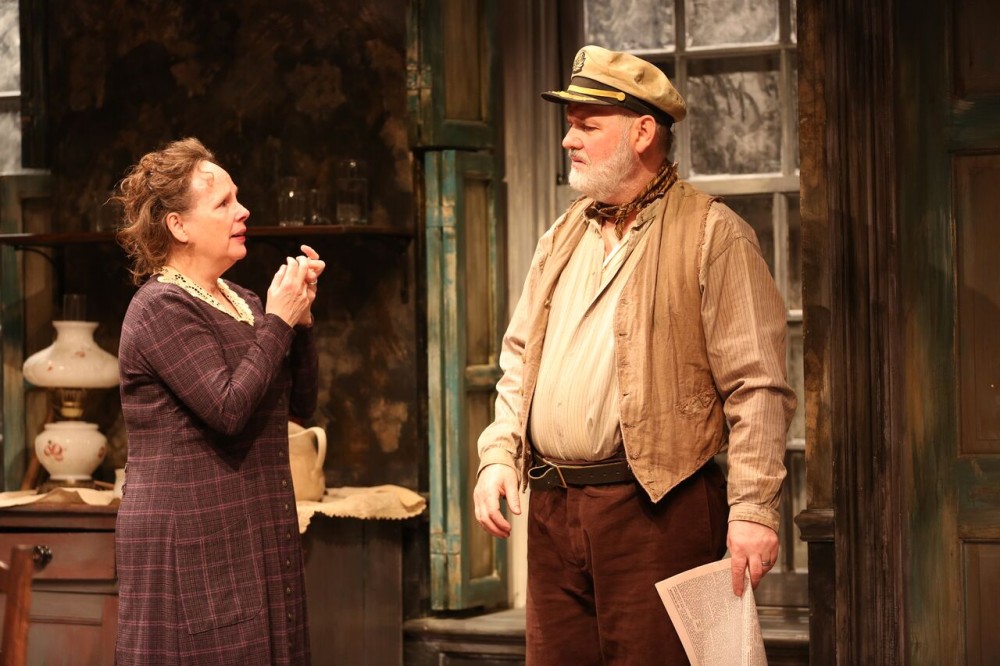


A Farce of Gender-Bending Cultural Expectations
by Carole Di Tosti
Happily After Ever by Laura Zlatos, directed by Sherri Eden Barber, turns stereotypic notions about marriage, gender and fulfillment upside down using irony, farce and pathos. The strength of Zlatos’ work is her theme: our mindless adherence to antiquated cultural gender mores produces ill health. If we apply such norms to our lives expecting to float along on a sea of contentment, storms will occur. It is then we are set adrift to realize that our existence is rigidly artificial and provides no foundation of truth or basis in reality to protect us. We must personally define our lives for ourselves.
The play is a kaleidoscope of micro-scenes. It follows the arc of a couple’s relationship from fortuitous meeting at a bus stop to subsequent marriage and the birth of their first child. Like mainstream cultural perceptions of relationships which morph according to the usual, expected development, Janet (Molly-Ann Nordin) and Darren (Jeffrey Brian Adams) are emotionally exuberant in their beginnings and everything progresses “normally.” As is typical of those who mate and marry in the unrealistic expectation that this action will bring them solace and happiness, they end up on a downhill slide into uncertainty and despair after the birth of their child who has male and female genitalia.



Janet and Darren’s superficial friendship with another couple, a gender-bending Dharma (Marlon Meikle) and Jerry (Brennan Lowery) who have a sentient pet dog, Tommy (Jim Anderson) is unsettling. The friendship between the couples never proceeds to a level of honesty or truth and, like the initial basis for Janet and Darren’s marriage, remains in the shallows and swamps of artificiality. It is an irony that their friendship with Dharma and Jerry, which could provide comfort, becomes another hurdle as they attempt to resolve the difficulty of how to raise their “unusual” child—whom they finally name Bean because the name indicates no sexuality.


Director Sherri Eden Barber has fine-tuned the pacing and progression of character development from naïve, blissful innocence toward Janet’s and Darren’s profound and desperate realization that their lives together are not what they imagined or desired. This is most potent in the beginning and in the last third of the play. There are lags and dead spots after the baby is born, and some of humorous satirical bits (i.e. the baby game), could be punched up. However, the fault may not be in the direction or acting but the way the scene is transitioned into the rest of the play.
The minimalistic sets and props serve the actors well and they are comfortably staged by the director who has shepherded the cast with precise and facile use of space. All the actors, especially Nordin and Adams, reveal an adroit facility with evoking background environment, setting and scene with little in the way of props.
The ensemble works well together because of Barber’s insightful direction. What is particularly smashing is the way that Nordin and Adams, awash in the “playfulness” of vapid cultural constructs, reveal glimmers of truth and profound revelation as they begin to “get” how their life together is not what they anticipated. Both soulfully express their character’s growing enlightenment that perhaps they have donned the culture’s ready cloak and it is insufficient for all purposes, especially to live healthfully and well. In those fleeting moments of despair Nordin and Adams conveyed a rich inner life, and I found myself watching Nordin because it is in the precious seconds of truth that her humanity and sadness were most palpable. Anderson’s portrayal of Tommy, the dog, was down-to-earth, genuine, unassuming and truthful.
In this interesting production, the director and actors cannily reveal that internalizing sexual cultural norms as truisms will prevent individuals from experiencing their own personal freedoms. Self-discovery is blocked if one is prodded to travel the road most individuals perceive to be “normal.” For the individual, there is no “normal,” as the characters reveal in this genre mix of farce, theater of the absurd and satire. As Zlatos reveals, the Cinderella effect and its gender norms are still alive. Maybe those social constructs need to be put to rest.
Happily After Ever. Through April 16 at 59E59 Theaters (59 East 59th Street, between Park and Madison Avenues). 70 minutes, no intermission. www.59e59.org
Photos: Erik Carter






















